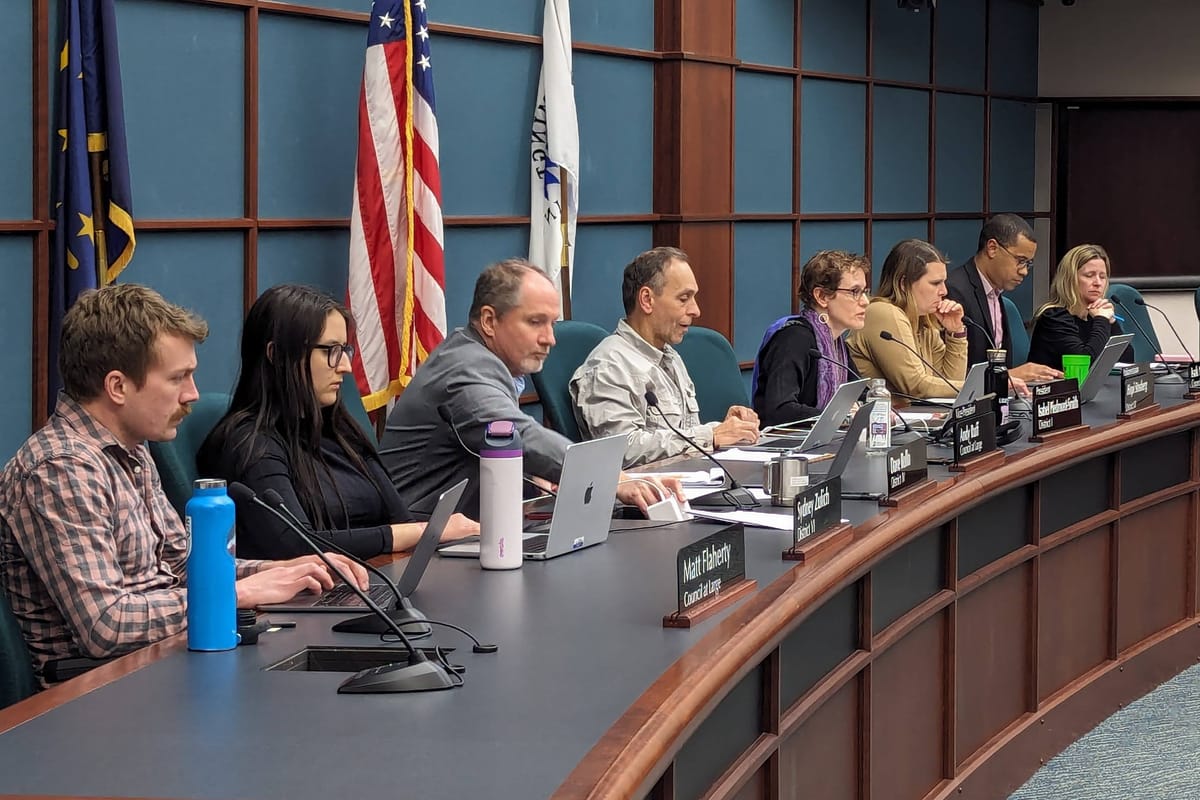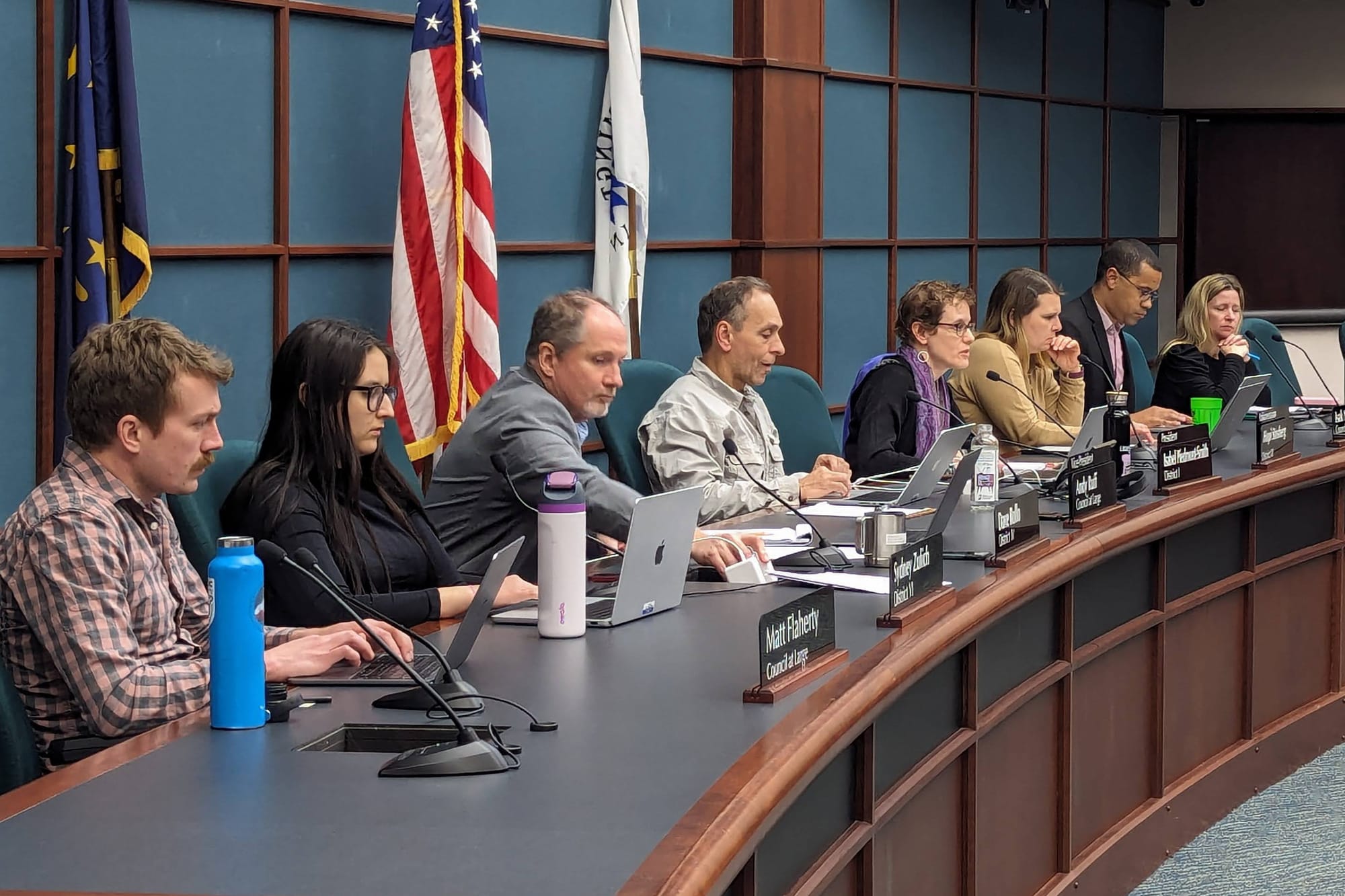Bloomington’s city council set for potential override vote on mayoral veto of LEAP pipeline resolution



Appearing on the Bloomington city council’s meeting agenda for next Wednesday (April 17) is a resolution opposing the construction of a pipeline in north central Indiana for the diversion of water from the Wabash River.
The pipeline is part of the LEAP (Limitless Exploration/Advanced Pace) District, which is a project of the Indiana Economic Development Corporation (IEDC).
The resolution was already approved by the city council at its March 27 meeting, with support from five councilmembers.
But in order to be considered an adopted resolution of the city council, it will need to pick up a sixth vote of support on Wednesday. That would give it the required two-thirds majority needed to override a mayoral veto.
Bloomington mayor Kerry Thomson did not sign the resolution within a 10-day window after it was presented to her by city clerk Nicole Bolden, on April 1, which effectively vetoed it. That’s even though Thomson did not return the resolution to the council, with a message announcing her veto with a reason for it.
Indiana state law does not give an option to mayors other than to sign legislation, or affirmatively veto it. But state law does make clear what the status of the legislation is, if the mayor fails to perform their duty, either to sign the resolution or veto it: The legislation is considered vetoed.
Here’s how the state law reads:
IC 36-4-6-16 Ordinance, order, or resolution; power of city executive to approve or veto Sec. 16.
(a) Within ten (10) days after an ordinance, order, or resolution is presented to the city executive, the city executive shall:
(1) approve the ordinance, order, or resolution, by entering the executive’s approval on it, signing it, and sending the legislative body a message announcing the executive’s approval; or
(2) veto the ordinance, order, or resolution, by returning it to the legislative body with a message announcing the executive’s veto and stating the executive’s reasons for the veto.
The executive may approve or veto separate items of an ordinance appropriating money or levying a tax.
(b) If the executive fails to perform the executive’s duty under subsection (a), the ordinance, order, or resolution is considered vetoed.
(c) Whenever an ordinance, order, or resolution is vetoed by the executive, it is considered defeated unless the legislative body, at its first regular or special meeting after the ten (10) day period prescribed by subsection (a), passes the ordinance, order, or resolution over the executive’s veto by a two-thirds (2/3) vote.
Before the council voted on March 27, Thomson gave a clear indication she would not be signing the resolution, or any similar resolutions in the future.
Addressing the council, Thomson put it like this: “While it is your prerogative to pass resolutions that express viewpoints on matters that we do not oversee, as a matter of principle, I will not be signing any resolutions that do not directly impact the business of our city.”
After the vote, The B Square got clarification from Thomson that her intent was simply not to sign the resolution, or similar advocacy resolutions—as opposed to actively vetoing it. Bloomington’s corporation counsel Margie Rice described that approach to The B Square as a kind of “pocket veto.”
The term “pocket veto” is used to describe only a specific circumstance when the U.S. president does not sign a bill. If the president does not sign a bill, and does not veto it, then all other things being equal, the bill becomes law by default. That’s the opposite of the default for legislation approved by the city council, if the mayor does not sign it.
A “pocket veto” describes only a situation where the U.S. president does not sign a bill, and does not affirmatively veto a bill—but the Congress adjourns its session sooner than 10 days after passing the bill. That’s a circumstance where the U.S. president is “prevented” from returning the bill to the Congress.
From Article I, Section 7, Clause 2 of the U.S. Constitution (emphasis added):
If any Bill shall not be returned by the President within ten Days (Sundays excepted) after it shall have been presented to him, the Same shall be a Law, in like Manner as if he had signed it, unless the Congress by their Adjournment prevent its Return, in which Case it shall not be a Law.
The resolution opposing the LEAP pipeline, which had been put forward by Andy Ruff, got support from five councilmembers. Voting for it were: Ruff, Dave Rollo, Isabel Piedmont- Smith, Hopi Stosberg and Courtney Daily.
Abstaining on the vote were: Matt Flaherty, Sydney Zulich, Isak Asare, and Kate Rosenbarger.
The resolution passed with some amendments, including one that added a request that the General Assembly establish a comprehensive water management plan.
To at least some extent, sentiment among abstainers seemed to align with Thomson’s stated reason for not planning to sign the resolution opposing the water pipeline: It did not directly affect the business of the city. At the March 27 meeting, Flaherty put it like this: “This feels like pretty far down the spectrum of the kinds of issues that we should be directly addressing.”
Councilmembers are not required to vote the same way on the resolution as they did previously when they reach the item on their agenda at next Wednesday’s meeting.
The item appears on the agenda, because council president Isabel Piedmont-Smith directed council administrator/attorney Stephen Lucas to include it, according to Lucas.
Another advocacy resolution adopted by the city council could also soon be back on its agenda, if Thomson does not sign it. At its April 3 meeting, the council passed a resolution that calls for national leaders to work towards a ceasefire in Gaza so that humanitarian aid can be delivered.




Comments ()